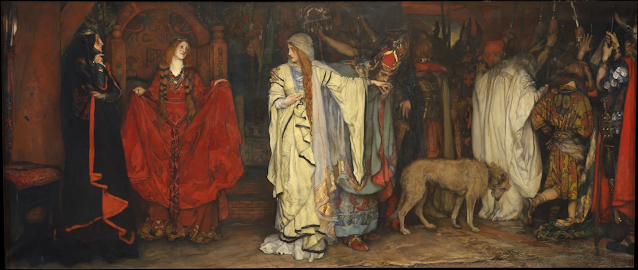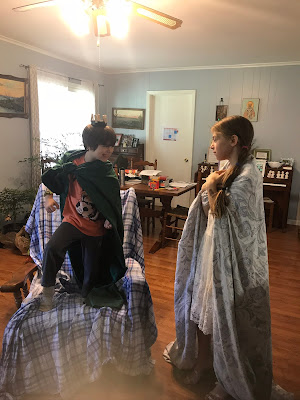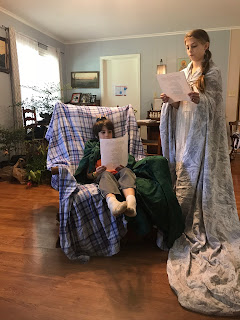Last week I shared some reasons WHY it can be good to read Shakespeare.

Shakespeare’s plays have found a home deep in the gut of an awful lot of people, people from super diverse backgrounds and in varying time periods. This reveals that something within the plays transcends time and place – that something is truth. It's the same truth we see in fairy tales, because the plays are patterned after the same structure as fairy tales.
I've heard that perhaps we should avoid Shakespeare plays because all theatre is dangerous. I can think of one reason why this might be true: if his plays contradicted the Gospels, we would be wise to pass. While it is true that not all of the plays are appropriate for all ages, I think they complement the Gospels, and I’ll explain why next week. Of course, you the parent know what is best for your family and should make the final call!

But for now, here's what I want to share with you.
3 Easy Steps to Understanding a Shakespeare Play
1. Read the story of the play from Lamb's Tales of Shakespeare for Children
2. Read the actual play aloud together.
3. Watch a production together.
The goal is to get the big picture. Not to understand every word. Not to analyze the symbols or settings or characters. Not to be able to answer test questions.
Just to receive the story on the most basic level.
Let me give you some tips for these three steps.
1. Read the story of the play from Lamb's.
I found my old illustrated version at a thrift store for a few dollars.
On the other end of the spectrum, you can splurge for a collector's edition for $144 - crazy! It is beautiful...
What I really appreciate about the Lamb's version is that they have kept many of the most important lines intact, as well as the important themes and ideas and tensions. All the while, the language is completely appropriate for any age. Here's an example:
In Much Ado About Nothing, a young count is tricked by an evil villain into thinking his fiancé has been unfaithful. He confronts her on the wedding day.
Claudio: (referring to Hero) Give not this rotten orange to your friend... She knows the heat of a luxurious bed!"
In Lamb's version, Claudio thinks he sees her talking to a man outside her window, and the next morning "Claudio, in the most passionate language, proclaimed the guilt of the blameless Hero..."
See? You can share the stories with your children without any worries.
I will admit that I didn't start reading the actual plays aloud until my youngest was ten. The kinds of lines like the one I quoted above just go over his head, but you will know what is best for your family.
What if you want your family to act out at least a part of the real play, but not read the whole thing?
I highly recommend this coloring book, which also has one-page scenes your children can act out, like my youngest two did with King Lear.
Once you've read 2-3 paragraphs (just pause when it feels right, when the scene changes or characters leave or enter) ask the children to tell you back what they heard. Tell them they will be asked to do this before you begin.
Why Tell it Back?
1. Knowing they are going to have to tell it back to you helps them pay attention while you read.
2. The process of sorting through what they heard and sharing it aloud helps them absorb the play better. It can be compared to chewing food. You wouldn't want them to swallow a steak whole, and neither would you want them to swallow a Shakespeare story whole. Telling it back allows them a chance to chew and digest.
One last tip for Lamb's: I suggest the parent or a very capable teen read this version aloud for everyone. The language, though appropriate for children, is not simple.
As you read, do not rush! Take it slowly - even just a couple of paragraphs per day - until you have worked your way through it. Pause and try to emphasize words, vary your tone of voice, and share the feeling of the story. You do not have to be an actress or do special accents or voices, but do try to avoid sounding monotone.
Let's move on to the second step:
2. Read the actual play aloud together.
Purchase a copy of the play for each family member, so everyone can hold their own script. The books do not have to be the same because you can find your place by referring to Act, Scene, and line #s instead of pages.
I picked up these inexpensive copies at our local thrifty bookshop, which is near a college campus and has dozens of each play.
Caveat: try to avoid No Fear Shakespeare for read-alouds. These editions might be a useful resource for studying a play, but that is not what we are doing. The formatting is distracting during a read aloud. Every left-side page is Shakespeare's play, and every right-side page if a simplified modern translation of the same lines. Sometimes a child will keep reading into the right page and all the sudden sound strange.... or a child might stop to interrupt every few lines to tell you exactly what something you just said means. That defeats the goal of getting the big picture and enjoying the flow of the play.
Ask for volunteers or assign roles. Perhaps give yourself the longest, hardest speeches.
Assign someone to read the stage directions. They are usually in italics, something like enter Claudio and Hero.
Go for it!
You might be surprised how well you all do! It really helps that everyone already knows the story. Remember, the goal is not to understand every word, but to get the gist of the story. Sometimes you will encounter characters that were not in the Lamb's version, but you can just remind your children that they couldn't include everyone.
3. Watch a production together.
One year I found out a local college was performing The Tempest in the Spring. I called and asked if the show would be family friendly or a more experimental version (important to know!). Once I knew it was good for us, we spent the fall working our way through Lamb's and then the play. It was fun to see the live versions of the characters we had come to know, and it provided lots of conversation afterwards.
Older Globe Theatre productions are amazing. You can buy them from
Great Britain or find used ones on ebay. They are acted out with an audience in a reproduction of the theatre Shakespeare's plays were orginially performed in! Stick to the older ones, though for a more PG experience. Newer ones are just like newer TV shows in that respect.
If you have a Shakespeare-in-the-Park near you, those are fun outdoor productions.
Film Versions
Be aware of modern, agenda-driven films.
Your local library probably has quite a few selections. Just check the rating to make sure there is no surprise nudity. (Sometimes you can avoid a particular scene in an otherwise great film by announcing a "potty braek" and fast-forwarding while everyone is gone. You have to preview it yourself first for that to work.)
You don't have to do this last step, but it is a nice way to end your time with a play.
As you share a play with your children, you will build a relationship with the ideas in the play and with each other. Of course, being aware of the stories is NOT a path to virtue. You have to pray and read the Scriptures and pray and read the Lives of the Saints and pray and struggle together with your children.
Even though the plays are not a fast-track to attaining virtue (there never is a short-cut, is there?) they are still full of good and true and beautiful things that open a person's heart to seeing beyond our material world.
Perhaps you are still concerned about hurting your children's imagination. This is a valid concern! You might would like to learn more about what the Church Fathers teach about the imagination before jumping into Shakespeare? St. Gregory Palamas explains how good art helps the imagination. Here’s a great place to start:

(You may have to scroll down to March 2022 if you happen to be reading this at some future date.)



















